CLICK HERE for the latest market quotes from the Iowa Agribusiness Network!
CLICK HERE for the latest market quotes from the Brownfield Ag News Network!
CLICK HERE for the latest market quotes from the Iowa Agribusiness Network!
CLICK HERE for the latest market quotes from the Brownfield Ag News Network!
WILLIAMSBURG, Iowa (KCRG) – Kinze Manufacturing, Inc. has notified 193 workers that they are being laid off from the company’s operation in Williamsburg, according to Iowa Workforce Development’s WARN notification list. According to the WARN listing, affected employees were notified Wednesday with the layoff date listed for Thursday. Kinze is a global manufacturer of planters, grain carts, and high-speed tillage equipment.
The layoffs at Kinze come during a difficult period for farm equipment manufacturers that economists say is being driven by a slower demand for farm equipment, including tractors. John Deere has laid off hundreds of workers in eastern Iowa and the Quad Cities in recent weeks and months.
(Radio Iowa; UPDATED) – Iowa Agriculture Secretary Mike Naig says he’s concerned about what state law says about how crop land and pastures are to be restored after a hazardous liquid pipeline is built. “Should we look at that law? I think we can,” Naig says. “Eminent domain use should be rare. It should be used when there are significant property agreements in place.” But Naig says the legislature’s priority should be establishing guardrails and defining terms.
“I would be careful of going in and saying specifically: ‘This kind of project should or should not be allowed,'” Naig said. “Look at those broader principles. Does it have an overwhelming impact?…Is it used in cases where there’s voluntary agreement? What’s the right number for that?…Maybe some additional teeth in the restoration process to ensure that land is useful afterwards. I think those are things that are very logical to look at after we’ve gone through a process now.” Naig has read through the Iowa Utilities Commission decision granting a construction permit to Summit Carbon Solutions.
“Nobody likes eminent domain. Nobody, but Iowa law allows for it and Iowa law allows for it when it’s justified. How is it determined whether it’s justified? Utilities Board. Should we look at that law? I think we can,” Naig said. “Eminent domain use should be rare. Eminent domain should be used when significant voluntary agreements are in place.” But any eminent domain changes would be for projects proposed in the future, not the Summit pipeline. Naig says there could be an upside for the ethanol industry and corn growers if the pipeline’s built.
“Whether you like it or not…there could be an expansion signal even sent to the ethanol industry as we look at now using ethanol to make sustainable aviation fuel. If you’re going to make sustainable aviation fuel, you’ve got to lower the carbon intensity of ethanol,” Naig said. “There are many ways to do that, but we should be looking at all the options there. So is there potential value in this? Yes.” Naig expects lawsuits will be filed to challenge the state-issued construction permit for the pipeline and he says there may be other things lawmakers can learn through that process.
Naig made his comments during a recent appearance on Iowa Press on Iowa P-B-S.
(Adair, Iowa) – An accident early this (Wednesday) morning, north of Adair, resulted in the death of 18 hogs, some of which were badly injured and had to be put down by law enforcement. Guthrie County Sheriff Marty Arganbright told KJAN News the accident happened at around 3:30-a.m. as the semi tractor trailer was heading west/southbound on White Pole Road. When the semi came to the intersection with Frontier Road, the driver slowed down, but didn’t get slowed-down enough to stop at the posted intersection. As he turned right onto Frontier Road, a load of about 160 fat hogs being taken to market, shifted, causing the trailer to tip over into the ditch, taking the semi cab with it.
Sheriff Arganbright said the hogs loaded on the top, inside deck of the trailer, went through the roof of the trailer and became piled-up onto of one another. The animals – he said – were scared and traumatized. They had lived most of their lives on a concrete pad and were already stressed by the road trip. The driver, and his young son (Whose names were not immediately available), were not hurt.

photo submitted to KJAN
The Sheriff and Deputy Blake Michelson worked traffic control while the remaining hogs were being rounded-up and loaded into another livestock trailer. The whole process took about six-hours. Richter and Son Towing removed the semi from the scene.
(Harlan, Iowa) – Officials with Practical Farmers of Iowa, a nonprofit organization with more than 8,000 members that equips farmers to build resilient farms and communities, says Rosmann Family Farms in Harlan (at 1222 Ironwood Rd.), will host a Practical Farmers of Iowa (PFI) field day on August 10th. The event – which takes place from 3-until 5-p.m., covers pasture management with rotational grazing and cover crops, is free to attend and open to the public. Attendees can RSVP by visiting the event page or calling PFI at (515)-232-5661. More information about the field day is below and full details can be found on the event’s webpage.
David Rosmann operates Rosmann Family Farms in Harlan, along with his wife Becky and their children, his parents, and brother. Their 700-acre certified organic farm is a mixture of field crops, pasture, popcorn, small grains and hay as well as cattle and hogs.
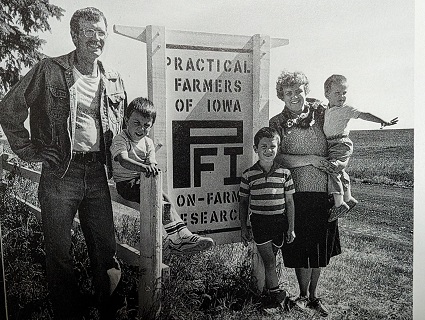
The Rosmanns (Photo supplied by PFI)
Strong proponents of rotational grazing, the Rosmanns pay close attention to the health of their pastures at all stages of their grazing calendar. At the Aug. 10th field day, you’ll learn about the systems-based approach the Rosmanns take that can work on any farm, showcasing grazing, row crops, small grains and cover crops.
David will discuss the cool- and warm-season planting mixes that accompany each grazing period, as well as cattle maintenance and using hogs for fertilizer. He’ll share how the farm lowers its overall inputs by composting manure. You’ll also hear how the Rosmanns seed rotational cover crops, such as hybrid rye, for livestock feed and as a supplement for cattle and hogs.
(Council Bluffs, Iowa) – An Iowa company is suing its marketing partner for $7 million in damages caused by alleged errors in attempting to sell fuel-grade ethanol produced in Iowa and Nebraska. The Iowa Capital Dispatch reports Southwest Iowa Renewable Energy, or SIRE, is a Council Bluffs-based company that has hundreds of member ethanol producers in Iowa, Nebraska, Wisconsin, Minnesota, and 18 other states. It is suing a Missouri company, Bunge North America, with whom it partnered to sell SIRE-produced ethanol.
SIRE is a dry-mill grain processing facility that each year produces millions of gallons of fuel-grade ethanol from grain that originates in southwest Iowa and southeast Nebraska. Bunge is an agronomic business focused on the purchase, storage and eventual sale of products, including ethanol, within North America. In the ethanol market, it’s common practice for ethanol producers such as SIRE, to contract with ethanol marketers tasked with finding buyers who are willing to purchase the commodity at the highest possible price and then negotiating with rail lines and trucking companies to achieve the lowest possible rates for shipping the ethanol. In order to do all of that, the lawsuit alleges, ethanol marketers must have expertise related to complicated and ever-changing federal and state renewable fuel standards.
In 2020, SIRE contracted with Bunge to market and sell all of SIRE’s ethanol in return for a monthly fee. The lawsuit claims that until November 2022, Bunge successfully marketed SIRE’s ethanol though a single Bunge employee, Jeremy Ragan, who was conversant with ethanol buyers and well versed in SIRE’s objectives. However, at the end of November 2022, Ragan informed SIRE that Bunge had terminated his employment. In the weeks that followed, the lawsuit claims, Bunge had inexperienced workers trying to market SIRE’s ethanol but who sold the product at old or incorrect values. In addition, the lawsuit accuses Bunge of failing to submit the necessary paperwork order for it to sell SIRE’s ethanol in California.
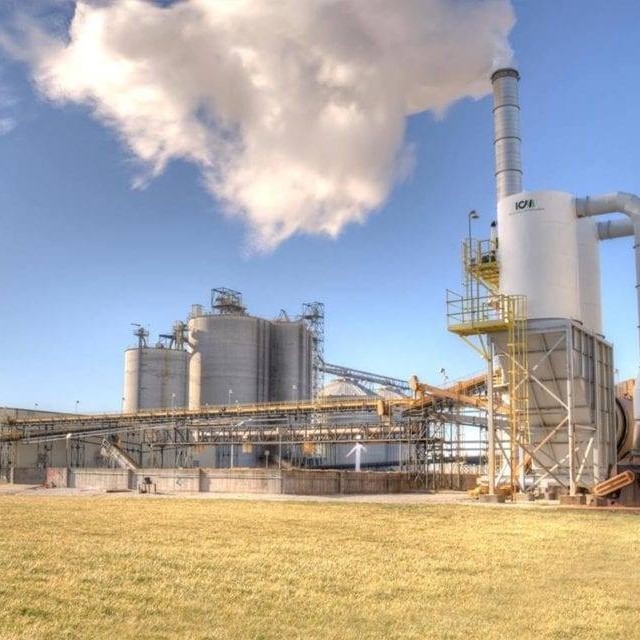
SIRE ethanol plant (company Facebook photo)
The lawsuit alleges that those and “other deficiencies and errors have resulted in SIRE losing profits on, at times, a daily basis … Bunge’s deficient marketing services have cost SIRE at least $7 million dollars between October 1, 2022, through December 31, 2023. SIRE’s damages have continued to accrue daily.” The lawsuit, filed this week in U.S. District Court for the Southern District of Iowa, seeks “at least $7 million,” plus interest, for breach of contract and unjust enrichment.
(Radio Iowa) – Iowa State University researchers estimate a viral disease cost the U-S pork industry more than one-billion dollars each year between 2016 and 2020. Porcine reproductive and respiratory syndrome or PRRS (PURS) can be deadly for pigs, and it can reduce a sow’s ability to give birth to healthy piglets. Derald Holtkamp, an I-S-U professor in veterinary diagnostic and production animal medicine, says it’s hard to stay ahead of PRRS because it mutates so quickly. “Several times we thought we had the PRRS virus kind of sorted out,” Holtkamp says. “We thought we had solutions to control it and within a few years, we are made to look stupid again. It just has this ability to continually evolve.”
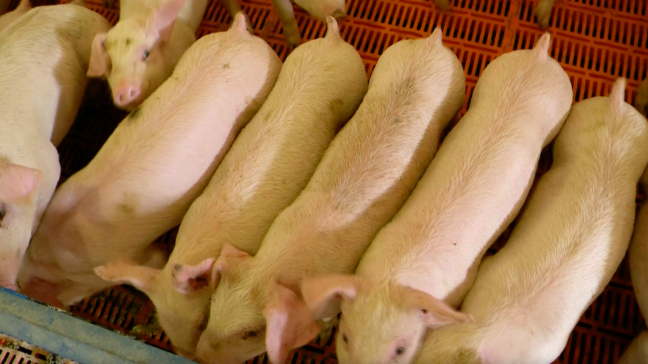
Piglets (ISU photo)
Researchers say the economic impact in 2020 was 80-percent higher than it was a decade ago, mostly due to higher rates of pig herds getting infected and poorer productivity in infected herds. “The only way to really slow that down or prevent it is with biosecurity,” Holtkamp says. “We have to get better as an industry of preventing that virus from moving from one farm to the next or prevent it from getting into farms.” That includes taking extra precautions, Holtkamp says, like sanitizing livestock trailers.
(story contributed by Rachel Cramer, Iowa Public Radio)
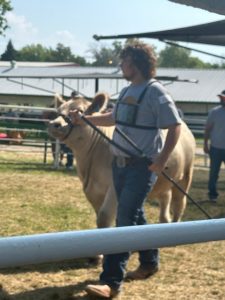 Jace Thomsen of Cumberland had an emotional Cass County Fair. He was named as the Fair Prince during the royalty coronation to begin the fair. That gave him a chance to hand out awards and interact with many of the young 4-H and FFA members. He won a lavender award with his heifer in the FFA Beef Show on Monday. But, what happened at the livestock sale to close the fair on Tuesday left a number of people with misty eyes.
Jace Thomsen of Cumberland had an emotional Cass County Fair. He was named as the Fair Prince during the royalty coronation to begin the fair. That gave him a chance to hand out awards and interact with many of the young 4-H and FFA members. He won a lavender award with his heifer in the FFA Beef Show on Monday. But, what happened at the livestock sale to close the fair on Tuesday left a number of people with misty eyes.
Jace lost his dad, 60 year old Jeff “Swampy” Thomsen, earlier this summer.
Local auctioneer Mark Venteicher said raising and preparing the cattle for the fair was something Jace and his father enjoyed doing together. So, Mark and some friends decided to make the sale of that heifer a big one. The packer price from Tyson Foods was set at $1.95 per pound on the 1,234 pound heifer. Venteicher and Massena Livestock Sales, along with Anita Vet Clinic, Dave Steffen, 21st Century Co-op, Houghton State Bank, Dan’s Welding, Bill Hosfelt, Curt Behrends, Steve Jorgensen, Tanner Farms, Mike Pellett, Darrin Shafer, Mitch Kleen, Glenn Sonntag, Greg Zellmer and Dave Williamson pooled their money together to provide Jace with a purchase price of $9.25 per pound, making the total on the animal $11,414.50.
Venteicher said they wanted to show support for Jace and provide some money for college.
It was, of course, the biggest sale from another successful livestock auction at the Cass County Fair.
(Iowa DNR News) – Pheasant hunters across the northern half of Iowa had an excellent season last year, and many are looking forward to what 2024 has in store. The fall forecast will be based on the Iowa Department of Natural Resources’ (DNR) annual roadside pheasant counts, that begins Aug. 1.
The statewide survey is conducted by Iowa DNR staff between Aug. 1-15, who drive 225, 30-mile routes on gravel roads at dawn on mornings with heavy dew. Hen pheasants will move their broods to the edge of the gravel road to dry off before they begin feeding, which makes them easier to count.
In June the DNR issued its annual prediction for the roadside counts, which uses a weather model based on the snowfall, rainfall and temperatures from the past winter and spring. The model provides a best guess at what the counts might look like, and it is predicting numbers to be likely lower than last year.

A pheasant flying over corn. (DNR photo)
But the best indicator for the fall season is the August roadside survey that counts actual pheasants seen along more than 6,000 miles of rural, gravel roads.
The August roadside survey has been conducted over the same routes since 1962. In addition to pheasants and quail, the survey collects data on partridge, cottontails and jackrabbits. Results will be posted online at www.iowadnr.gov/pheasantsurvey in early September. Iowa’s pheasant season begins Oct. 26.
(Iowa DNR News) – Fishing for catfish is a fun summer tradition for many Iowa families. Invite someone new to fishing to come along to share the fun and memories. “Catfish will bite most of the time, no matter what the water temperature,” explains Daniel Vogeler, Iowa DNR fisheries technician. “They are biting in most lakes, ponds, rivers and streams across Iowa.” Bring along two coolers with ice, one to keep your bait firm and fresh and another to keep your catch cold and preserve that great taste.
Catfish have a great sense of smell and taste. Try prepared dip baits, chicken livers, minnows or chubs, green sunfish, bluegill, crawdads, frogs, nightcrawlers or dead, but fresh, goldeye or gizzard shad. Lakes stratify, or form layers, this time of year, with cool, oxygen-deprived waters sinking to the bottom. Don’t fish in water deeper than 8 to 10 feet on most lakes.
Look for areas with vegetation, brush piles or rock. Use the DNR interactive fishing atlas to help you quickly find these spots. Fish the upper ends of the larger reservoirs where the water is shallower and baitfish like gizzard shad gather. Use baits fished on the bottom or suspended off the bottom with a bobber and let current or breeze move the bait to find active catfish.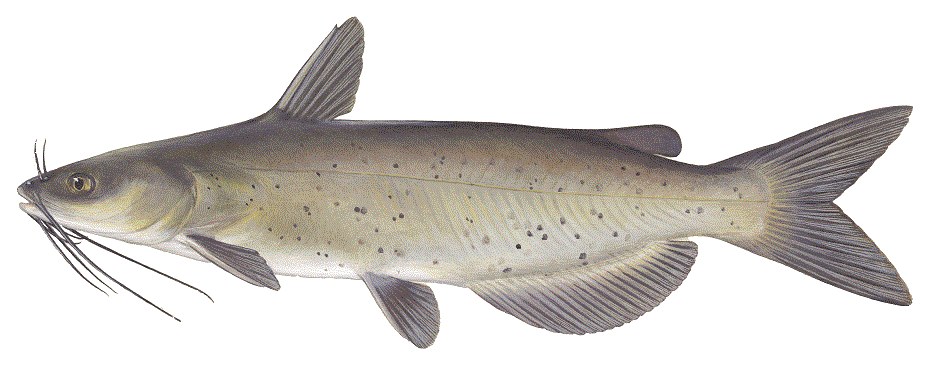
Iowa rivers are loaded with catfish. Look for fish around downed trees and brush piles, but don’t overlook rock piles or other objects that deflect water and form a current seam. Position your bait just upstream of brush piles so the scent of the bait is carried downstream into the structure to draw the catfish out. Anchor the bait with a heavy weight so it doesn’t drift into snags. If fishing the big rivers, try upstream and on the tips of wing dykes and wing dams on the Missouri and Mississippi rivers.
Find more tips for catching, cleaning and cooking catfish on the DNR website at www.iowadnr.gov/Fishing/Fishing-Tips-How-Tos/How-to-Fish-For-/Channel-Catfish-Fishing.
(UPDATED/Radio Iowa) – An armored animal most people would associate with Texas or Oklahoma is being spotted more frequently in Iowa. Armadillos have been making their way north for decades, according to Jim Coffey, an Iowa D-N-R wildlife biologist. Coffey tells K-C-R-G T-V that armadillo sightings are being tracked by the agency.
“Armadillos are not something that’s new to Iowa,” Coffey says. “We’ve had reports for many, many years, but it’s a species that’s not commonly seen and it kind of falls through the cracks.” For the past several years, Coffey says the D-N-R has been logging sightings of these armored critters anywhere they appear in Iowa.
“We’ve been keeping, you know, good records for the last six years that have indicated about 12 to 24 sightings per year, verifiable across the state,” he says. Armadillos can jump up to four feet into the air and they average about 12 pounds as adults. Coffey says the state’s changing climate played a big part in the arrival of armadillos.
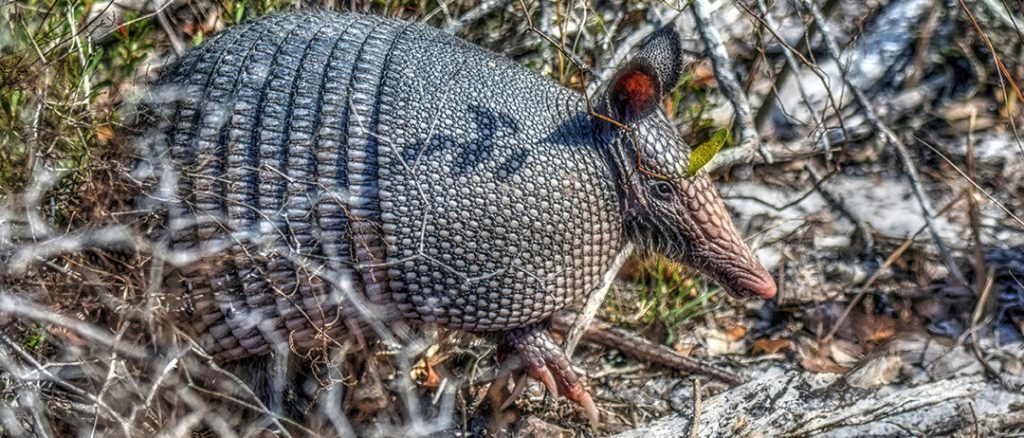
Armadillo — National Park Service photo
“As climate change takes impact, we see that some of our northern boundaries are pushed, or the warmer climates are pushed further north,” he says, “then armadillos will be able to utilize that territory as well.” The DNR has no plans to manage the spread of armadillos, since the only threat they pose to the ecosystem is digging burrows to live in. Plus, they can’t survive harsh winters, so armadillos aren’t established in Iowa — at least not yet.